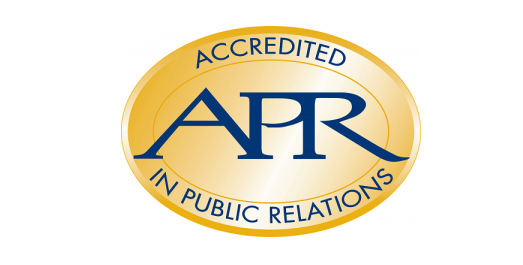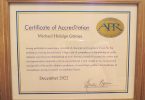Earning my APR was one of the best decisions I have made.
I am a professor of public relations, and my job requires me to publish in peer-reviewed journals, teach undergraduate and graduate courses, and serve on university and convention committees.
In short, I am, like most people, very busy. However, earning my APR was something that I wanted to do for years. I thought that it would bring a level of professional credibility to my academic degrees, and I knew it would allow me to engage with the PR industry and PRSA in a way that I could not otherwise. I wanted to give 100 percent to preparing for the Examination for Accreditation in Public Relations. However, I kept asking myself, “When will I know I am ready?”
Setting a date
My APR journey started a year before I went through my panel presentation and took the Examination. I started by looking through my PR campaigns that I could use for the portfolio, and I also enrolled in an online test prep course for the APR Examination.
Through my studying I came to realize that the APR credential was not so much about memorizing facts, but internalizing the APR philosophy. This included appreciating the role of research, understanding the four-step RPIE process, and recognizing and applying ethical standards for PR practitioners.
Setting the Panel Presentation and the Examination date was somewhat of a relief. I knew that there was a hard deadline for completion, and I could work toward that. My Panel Presentation and Examination date was scheduled for this past April during an APR Boot Camp hosted by the PRSA National and the PRSA Richmond Chapter.
Surviving Boot Camp
The APR Boot Camp compresses the time between the Panel Presentation and the Examination. However, it is incorrect to think that the boot camp does all the work for you. Instead, the boot camp serves to facilitate the final preparation for the APR Examination. I would suggest that if you consider the APR Boot Camp (which I highly recommend), be 90 to 95 percent ready — they take you to 100 percent.
The first day of the boot camp was the Panel Presentation. We had to come prepared with our portfolio; our questionnaire was submitted a month before. I was expecting a grilling over my campaign, but instead I had a great conversation with the panel. They were warm and very welcoming, and I walked away thinking that it was similar to getting constructive feedback from PR colleagues.
One thing I would suggest is to take time on the questionnaire, as the panel had all read mine ahead of time. My answers on the questionnaire were long and detailed. I think that helped me during the actual presentation because many of their questions were already answered.
In addition, I suggest taking time on the portfolio. Put it together in the RPIE process, and be willing to admit that you might have changed things now that you have gone through the APR preparation. After all, preparing for the APR is a learning experience, and I think the panel appreciated that I acknowledged the APR experience had changed the way I thought about my field.
Making final preparations
After being recommended to Advance by the panel, two days were spent in final preparation for the Examination. I will say that the Examination is challenging. I started preparing for the Examination a year before by reading the study guide and suggested books. It is a multiple-choice test, and no answer was a throw away because they all potentially could be correct. I prepared by looking through the APR study guide, working with a study group I met during the boot camp and focusing on areas such as research and ethics that I knew were heavily tested on the Examination.
As a person who regularly teaches public relations, I knew many of the things that were tested, but I still had to study. My study group and my online class both used mock questions that we created as well as case studies. Because the test is largely conceptual and applied, this was a big help. I have taken many tests in my life including the bar exam, and I will say that the APR Examination is right up there as a challenging test. However, if you prepare and take it seriously, you will pass.
Looking back on my APR experience, I can say that it has changed me. It has changed how I think about public relations and how I teach it to my students. It also has been a rewarding process because of all of the people that I have met along the way. You will notice that many people use the phrase “earning your APR.” That phrase struck me as odd when I first heard it, but going through the process, I completely understand it.
The APR is not about an exam or a presentation. Instead, it is about demonstrating that you accept and are a part of a select group of PR professionals. I knew that I was ready to “earn my APR” when I made up my mind that I wanted to be part of that PR community. It has surely been worth it.
For more information about the Accreditation in Public Relations process, visit www.praccreditation.org.
Cayce Myers, Ph.D., J.D., APR, is an assistant professor in the Department of Communication at Virginia Tech where he teaches public relations. As a lawyer and PR scholar, Myers’ research focuses on the intersection of law and public relations, and how legal issues affect modern-day PR practice.








Everything the professor says is absolutely, unequivocally true. When I was in college, my journalism major courses touched on public relations with one chapter in our mass communications textbook. It was likened mostly to the publicity function. After receiving my degree, I went into the Army and, because of my journalism degree, was assigned as a public information officer. At first, I was clueless about my responsibilities, but I managed to learn on the fly with the help of my civilian and military colleagues. I learned that the PIO function is the governmental equivalent to public relations. However, the true meaning of public relations was instilled in me during a year-long Certificate in PR program at UCLA and later during my quest for the APR. It proved to me that experience counts when taking the exam and that a thorough knowledge of ethics, business practices, communications and research methods are essential for a successful career in public relations.